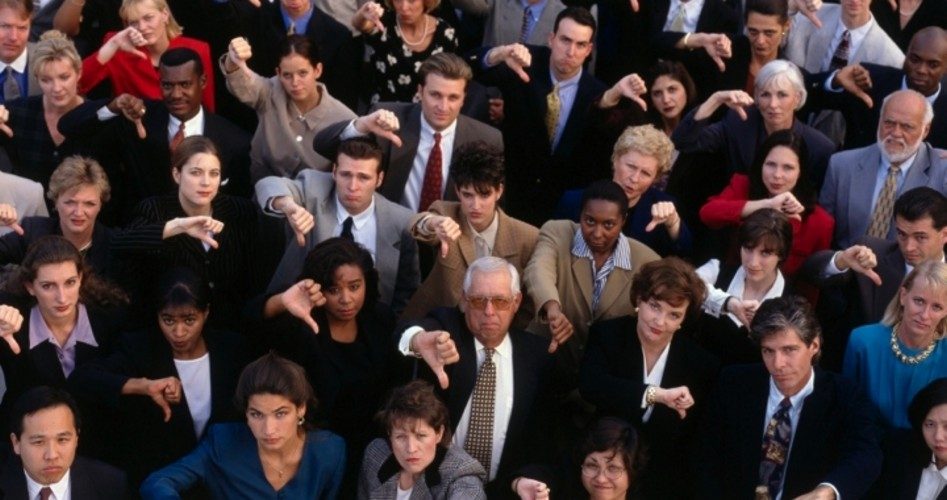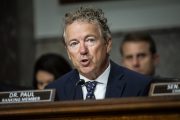
A new poll from Benson Strategy Group confirms not only that most Americans don’t want an increase in their gasoline taxes but that they’re afraid Congress will enact one anyway. Coming on the heels of Republicans joining with Democrats to pass a pork-laden CRomnibus bill earlier this week, the poll’s results show that two out of every three Americans don’t want to pay more at the pump.
Those polled are likely also concerned that the recent precipitous drop in the price of gas will be seized by the Congress as an opportunity to raise the tax with minimal initial pain to drivers.
An early attempt by a safe-district liberal Democrat from Oregon, Earl Blumenauer, a year ago to raise gas taxes by 15 cents a gallon failed to gain any traction, with just one co-sponsorship coming from a House member who knew he would be retiring this year.
Blumenauer rolled out all the traditional reasons for another tax hike on the taxpayer: The roads, streets, highways, bridges and aqueducts are failing, and the potholes are damaging autos and trucks and causing accidents, some of them fatal. He noted that Congress has, in its usual fashion, had to dump billions of taxpayer monies from the general fund at the very last minute into the Highway Trust Fund over the last few years just to keep it solvent. Besides, he added, the current tax of 18.4 cents per gallon of gas and 27.8 cents per gallon of diesel hasn’t kept up with inflation. His final plea was the usual one: 600,000 jobs will be at risk if something isn’t done.
Despite support from all the usual suspects — labor unions, cement and steel manufacturers, AAA and the trucking industry — Blumenauer’s bill went nowhere.
In July, Congress once again rushed to the rescue of the fund in a last-minute attempt to keep it from becoming insolvent by sending over another $10.8 billion of taxpayers’ money from the general fund to it. This happened in 2008 when the trust fund needed $8 billion from taxpayers to keep it solvent, and then again in 2009 and 2010 when it was shored up with transfers of $7 billion and $19.5 billion, respectively, from beleaguered taxpayers.
Two weeks later Senators Chris Murphy (D-Conn.) and Bob Corker (R-Tenn.) offered a bill to raise taxes on gas by 12 cents a gallon, in six-cent stages over two years. Murphy, a big-spending liberal who saw an opportunity as gas prices started their recent descent, whined: We’re losing hundreds of millions of dollars in economic productivity because we’re failing to invest in our nation’s roadway and rails.
Added one of the bill’s supporters, Terry O’Sullivan, president of the Laborers’ International Union of North America, “It’s time to end the “pothole penalty” — the lost lives, accidents and damage to vehicles caused by poor roads and deficient and obsolete bridges. Congress now has [the opportunity] to address our crumbling transportation infrastructure and they should feel compelled to do so.”
Corker, one of the senators who signed the Taxpayer Protection Pledge, tried to salvage his commitment not to raise taxes by pairing the increase with promises to renew other taxes that had recently expired. John Kartch, a spokesman for Americans for Tax Reform, the group behind that pledge, didn’t buy it: “The highway trust fund does not have an under-taxing problem. It has an overspending problem. There is no good reason to raise the gas tax.”
This was reiterated by Chris Chocola, president of the Club for Growth, who said, “This is a $164 billion dollar tax increase, plain and simple. A gas tax hike would be both bad policy and terribly anti-growth. It’s not an example of political courage to avoid reforming a broken system.”
A close look at the Highway Trust Fund reveals that it consists of three separate funds, only one of which actually pays for road construction and maintenance. The Mass Transit Account funds efforts proposed by states to build mass transit projects while the Leaking Underground Storage Tank Trust Fund dedicates its funds to self-evident leaks that have little if anything to do with transportation needs. Further, as presidents from Reagan to Bush to Clinton raised the tax from three cents to four cents to nine cents to 14 cents and finally to 18.4 cents, much of the additional revenue was earmarked for “deficit reduction” and not highway construction and maintenance.
In other words, vast sums raised from the gas tax are never applied to the nation’s transportation infrastructure. Instead the Highway Trust Fund has become a politician’s piggybank for other favorite projects.
When Corker asked famed fiscal conservative Senator Tom Coburn (R-Okla.) for his support on the bill, Coburn declined, offering a different and much more sensible approach: self-funding and user-pay. Explained Coburn, “User-pay is the way to go when building highways. But with it they ought to eliminate the 20 percent of the transportation fund that’s not spent on building roads … [those are] mandates by a bunch of bureaucrats in Washington.”
Rather than taxing citizens to pay for highways that they themselves might or might not use, some kind of user-pay system would be much more equitable, according to Marc Scribner of the Competitive Enterprise Institute. And part of the solution would be to “devolve” the present federal system back to the states, including the interstate highways that cross state lines. Merely raising taxes is a short-term remedy for a long-term problem. Wrote Scribner:
Proponents [for a gas tax increase] argue that the fuel tax has not been raised since 1993 and that inflation has eroded much of its buying power. This is true, but it also assumes the federal government has been and will continue to be a positive force in surface transportation. It has not, is not, and will not be. Count me among the supporters of devolving federal responsibility to the states.
Calling the present system “road socialism,” Scribner prefers that the states take back the responsibility and use various means to fund the transportation needs for their citizens. There could be toll roads, user fees based on mileage, or monthly subscription arrangements similar to buying season tickets to a concert. He says let the states experiment with what works best and keep the federal government out of the matter altogether.
Scribner is not optimistic: “Given public opposition to tax increases and trucking industry opposition to true user fees, the likely outcome is little or no positive change at the federal level. States will need to continue developing their own forward-looking funding and financing mechanisms, rather than assuming a pot of … gold awaits them at the end of the highway bill rainbow.”
A graduate of an Ivy League school and a former investment advisor, Bob is a regular contributor to The New American magazine and blogs frequently at www.LightFromTheRight.com, primarily on economics and politics.



